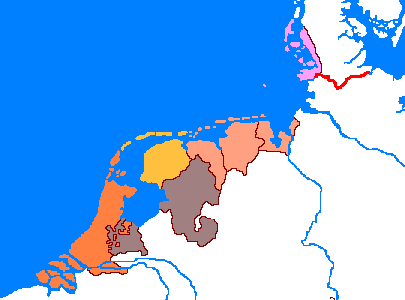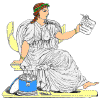|


Frisians is the name of a
Germanic tribe that the Romans subdued in 12 BC. They rebelled in AD 28, but
were again subdued and then finally regained their independence under the reign of
Emperor Claudius (41-54). In the latter part of antiquity, however, the
region became depopulated due to climate change and attacks from the
neighbouring tribes. When Frisians reappear in the sources during the
early Middle Ages, it is not the same people as the ancient Frisians. Rather,
it was later immigrants who got their name from the region
which in turn had been named after its older inhabitants.
The existence of a Frisian king named Finn can be documented in Anglo-Saxon
poems, but it is only during the seventh century that a Frisian kingdom emerges
in the sources. At that time in opposition to the powerful Frankish kingdom. In the
eighth century, the kingdom of the Frisians was conquered by the Franks, and
in the ninth century, the Frisians were exposed to the ravages of the
Vikings.
While the Frisian kingdom had comprised most of the present Netherlands,
the later region of Frisia was much reduced. After 1100 West Frisia was not
considered to be a part of Frisia. North Frisia had never been a part of the
Frisian kingdom and was probably populated sometime during the period of 700-1000.
The North Frisians did not form a political unit of their own, they belonged
to Denmark/Schleswig all the time. Frisia Proper in medieval time therefore
only included the eastern and middle part. This area was populated by free
peasants who successfully resisted all attempts by feudal lords to subdue them,
mainly the counts of Holland and the
bishops of Utrecht. In the east, local chieftains
created their own states (within the Holy Roman Empire) in the late Middle
Age. Middle Frisia and Groningen were finally conquered by Imperial troops in 1498
and became thereafter a part of the Dutch republic, which was created in
1581. Middle Frisia became the Dutch province of Friesland, which until 1747
and together with the province of Groningen was ruled by their own
stadtholder.

|
5th century
c.
600-630
c. 650-680
680-719
719-734
734-748
748-760
760-785 |
Finn (Folcwald's son)
Audulf
Aldgisl I
Radbod I (Radboud, Redbad)
Poppo (Bubo, Bobba)
Aldgisl II
Gundebold (Aldgisl III)
Radbod II (Radboud, Redbad) |
|
Most of
Frisia was conquered 734 by the Franks
East Frisia was conquered in the 780s
|
|
(734) -843
843-869
870-911
911-925
925- (1581) |
Part of the
Frankish kingdom
Part of Middle Francia (Lotharingia)
Part of East Francia (Germany)
Part of West Francia (France)
Part of Germany |
|
.

Viking Rulers and
Gerulfingian Counts
(all under Frankish sovereignty)
|
|
826-844
c. 833-856
850-882
882-885
c. 885-896 |
Harald Klak (county of Rüstringen)
 |
Gerulf I
Rorik (Hrörek)
Godfred (Haraldsson?) |

|
| Gerulf II |
 |
|
The Gerulfingian
descendants establish the county of Holland
in West
Frisia which after AD 1100 is no longer considered as
a part of Frisia. Conditions in the rest of Frisia are unclear,
but a county in that area emerge from about AD 1000
House of Brunswick
(the Brunonen dynasty)
|
c. 1000-1038
1038-1057 |
Liudolf
Bruno |
|
1057-1068 |
Egbert I |
 |
|
1068-1088 |
Egbert II |
 |
|
Different Dynasties
|
|
1088-1099
1099-1101
1101
1101-1107
1107-1138 |
Koenraad van Zwaben
(bishop
of Utrecht)
Interregnum
Hendrik van Northeim
Interregnum
Hendrik van Zutphen |
|
Ruled by the bishops
of Utrecht
|
|
1138-1139
1139-1150
1150-1156
1156- (1178) |
Andries van Cuijk
Hartbert van Bierum
Herman van Horne
Godfried van Rhenen |
|
Frisia is 1165
transformed into a condominium which is ruled jointly
by the bishops of Utrecht and the
counts of Holland. The joint rule
is however only theoretical since Frisia's central power collapsed
in the 12th century and local chieftains gained control.
Ruled by the Counts
of Holland
|
|
1198-1203 |
Willem I |

|
|
1203-1233 |
No central power |
|
1233 |
Floris IV |
 |
|
1233-1337 |
No central power |
|
1337-1345 |
Willem IV |

 |
|
1345-1358 |
No central power |
|
1358-1401 |
Albrecht van Beieren |


 |
|
1401-1498 |
No central power |
|
East Frisia with the exception of
Groningen is hereby separated
from Middle Frisia and their local chieftains create their own states.
The rest of Frisia is conquered by Imperial troops in 1498
Stadtholders of Frisia
|
|
1498-1500 |
Albrecht van Saksen |
 |
|
1500-1505 |
Joris met de Baard |
 (the
Bearded)
(the
Bearded) |
|
1500-1515 |
Hendrik de Vrome |
 (the
Pious)
(the
Pious) |
|
1515-1523 |
Karel van Egmond |
 (Groningen to 1536)
(Groningen to 1536) |
|

|
|
1515-1555
|
Karel (V)
|




|
|
1555-1581 |
Filips II |


 |
Frisia join the
United Netherlands in 1581

Like the other provinces in the Netherlands was Friesland (Middle Frisia)
administrated by stadholders. When the Netherlands declared its independence
in 1581 under the leadership of the house of Nassau-Orange, the stadtholders
became the real rulers. They were however not more than two persons (and
came from two branches of the house of Nassau). The most powerful
stadtholder was he who ruled Holland (and several other provinces) while the
other stadtholder who ruled
Friesland was usually in charge of Groningen and Drenthe as well (the
latter province was not considered to be a part of Frisia).
This separate Frisian stadtholderdom would exist to 1747 when its
stadtholder became regent over all provinces in the Netherlands.
|
Friesland
(united with Overijssel
1528-1584)
|
Groningen
(submitted to Karel V 1536)
|
|
1515-1518
1518-1521
1521-1540
1540-1548
1549-1568
1568-1572
1572-1574
1574-1576
1576-1581
1581-1594
1580-1584 |
Floris van Egmond
Willem van Roggendorff
Georg Schenck van Toutenburg
Maximiliaan van Egmond
Jan van Ligne
Karel van Brimeu
Gillis van Berlaymont
Caspar van Robles
George van Lalaing
(in Spanish service)
Francisco Verdugo
(in
Spanish service)
United with Holland |
1519-1522
1522-1530
1530-1536
1536
1536-1581
1581-1594
1594-1620
1620-1625
1625-1711
1711-1729
1729- |
Cristoffel van Meurs
Jasper van Marwijck
Karel van Gelre
Ludolf Coenders
United with Friesland
Francisco Verdugo
United with Friesland
United with Holland
United with Friesland
Period without stadtholder
United with Friesland |
|
1584-1620 |
Willem Lodewijk |
 |
Drenthe
(submitted to Karel V 1536)
|
|
1620-1632 |
Ernst Casimir |
 |
|
1632-1640 |
Hendrik Casimir I |
 |
|
1640-1664 |
Willem Frederik |
 |
|
1664-1696 |
Hendrik Casimir II |
 |
1536-1696
1696-1702
1702-1722
1722-. |
United with Groningen
United with Holland
Period without stadtholder
United with Friesland |
|
1696-1711 |
Johan Willem Friso |
 |
1711- (1751)
|
Willem (IV)
|

|
Willem IV became stadtholder of
Holland 1747
and as a consequence of this were all
Dutch provinces thereafter ruled by the
same stadtholder

With the exception of Groningen (which was conquered 1498 by Imperial
troops together with Middle Frisia) would East Frisia not be united with the
future Dutch republic. Instead local chieftains created two East Frisian
states, Ostfriesland and the small lordship of Jever. In the easternmost
part (Wursten east of Elbe) would the Frisian peasants succeed in preserving
their freedom until 1524 when their land was conquered by the archbishop of
Bremen.
|

House of Tom Brok
|

House of Wimkrok
|
|
? - 1371
1371-1391
1391-1399
1391-1417
1417-1427 |
Keno I (the Elder)
Ocko I (the Elder)
Widzelt
Keno II (the Younger)
Ocko II (the Younger) |
1350-1410
1410-1433
1433-1438
1438-1468
1468
1468-1488
1468-1511
1511-1517
1517-1536
1536-1575 |
Edo Wiemken I
Sibeth Papinga
Hajo Harlda
Tanno Düren
Hajo
Sibeth III (Sibethsburg)
Edo Wiemken II (Jever)
Christoph
Anna
Maria |
|
House of Ukema
|
|
1427-1431 |
Focko |
|
House Cirksena
(counts 1454-1654
and thereafter princes)
|
House of
Oldenburg |
|
? - 1400
1400-1450
1450-1466
1466-1491
1491-1528
1528
1528-1540
1540-1599
1599-1625
1625-1628
1628-1648
1648-1660
1660-1665
1665-1708
1708-1734
1734-1744
1744-1806
1807-1810
1810-1814
1815-1866
1866-1945
1945- |
Edzard
Enno
Ulrich I
Enno I
Edzard I (the Great)
Ulrich II
Enno II
Edzard II
Enno III
Rudolf Christian
Ulrich III
Enno Ludwig
Georg Christian
Christian Eberhard
Georg Albrecht
Karl Edzard
Part of Prussia
Part of Holland
Part of France
Part of Hanover
Part of Prussia
Part of Niedersachsen |
1575-1603 |
Johann XVI |
 |
|
1603-1667 |
Anton Günther |
 |
|
House of Anhalt-Zerbst
|
|
1667 |
Johann |
 |
|
1667-1718 |
Karl Wilhelm |
 |
|
1718-1742 |
Johann August |
|
1742-1746 |
Johann Ludwig II |
 |
|
1742-1747 |
Christian August |
 |
|
1747-1793 |
Friedrich August |
 |
|
1793-1796 |
Katharina II (the Great) |
 |
|
House of Holstein-Gottorp-Romanov
|
|
1796-1801 |
Paul |
 |
|
1801-1807 |
Alexander I |
 |
|
1807-1810
1810-1813 |
Part of Holland
Part of
France |
|
1813-1818 |
Alexander I (restored) |
 |
1818-1945
1945- |
Part of Oldenburg
Part of Niedersachsen |
|

